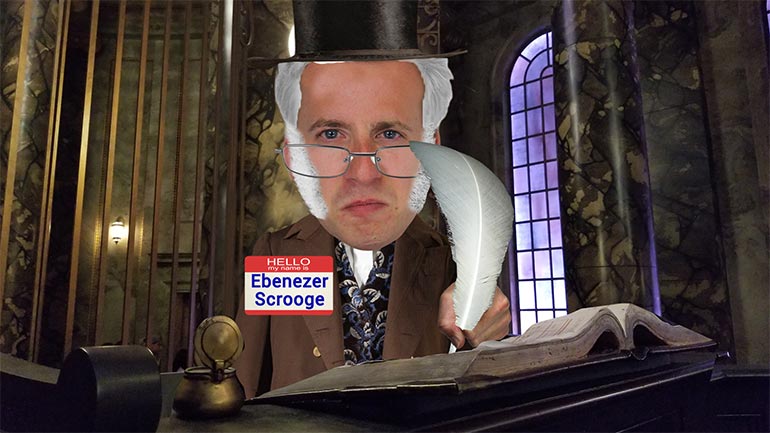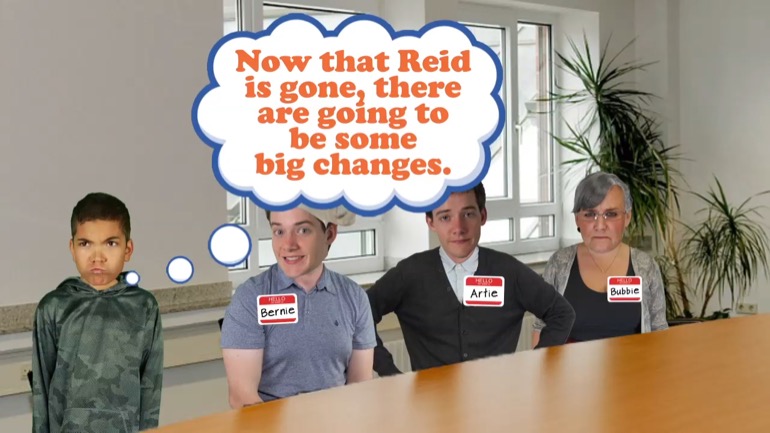ShmoopTube
Where Monty Python meets your 10th grade teacher.
Search Thousands of Shmoop Videos
Finance Videos 1063 videos
What is bankruptcy? Deadbeats who can't pay their bills declare bankruptcy. Either they borrowed too much money, or the business fell apart. They t...
What's a dividend? At will, the board of directors can pay a dividend on common stock. Usually, that payout is some percentage less than 100 of ear...
How are risk and reward related? Take more risk, expect more reward. A lottery ticket might be worth a billion dollars, but if the odds are one in...
Finance: What's the Difference Between Short-term and Long-term Liabilities? 35 Views
Share It!
Description:
What is the difference between short-term and long-term liabilities? Short-term liabilities show up on the balance sheet. They need to be paid in the short-term using the inflow from cash and accounts receivable, as shown on the balance sheet. These are things like accounts payable and employee salaries. Long-term liabilities are things like loans and such that the company won’t need to pay back for over a year.
- Social Studies / Finance
- Finance / Financial Responsibility
- Life Skills / Personal Finance
- Finance / Finance Definitions
- Life Skills / Finance Definitions
- Finance / Personal Finance
- Courses / Finance Concepts
- Subjects / Finance and Economics
- Finance and Economics / Terms and Concepts
- Terms and Concepts / Accounting
- Terms and Concepts / Bonds
- Terms and Concepts / Credit
- Terms and Concepts / Financial Theory
- Terms and Concepts / Metrics
- Terms and Concepts / Regulations
- Terms and Concepts / Trusts and Estates
- Terms and Concepts / Wealth
- College and Career / Personal Finance
Transcript
- 00:00
sure we've all heard of mystery stories, but what really makes a mystery
- 00:06
a mystery? okay yeah if you're reading something called the big book of [boy picks book off shelf]
- 00:10
mysteries, that's a pretty good hint. but we're looking for something a bit more
- 00:14
general than that. like most stories a mystery will contain stuff like
- 00:18
characters a setting and a plot, but there are a whole bunch of other
Full Transcript
- 00:22
ingredients that give mysteries that are distinctive and dare we say mysterious, [chef mixes ingredients]
- 00:27
taste. and no none of those ingredients are the mystery machines. well the first
- 00:33
one is a central problem aka a mystery to be solved like a crime. it's pretty
- 00:38
tough to solve a mystery if there's you know no mystery to solve. well you could
- 00:43
have a story where a detective goes to the beach with his friends and has a [2 men toss beach ball]
- 00:46
great time but with no problem well you've got no mystery. and sure the
- 00:51
detective might appreciate the day off but mystery stories aren't about
- 00:54
creating fond memories for fictional detectives. well the second element is a
- 00:58
list of suspects. if there's a crime to be solved then somebody must have [lineup shown]
- 01:01
committed that crime. and if there's only one suspect it's gonna be a pretty short
- 01:06
story, and not much of a mystery. so if you're bad at solving mysteries, well it
- 01:10
might be right up your alley. well the third element is a set of clues.
- 01:14
in a good mystery both the characters and the reader use clues to figure out [detective examines house]
- 01:17
who committed the central crime, and know the answer is rarely Miss Scarlet with
- 01:22
the candlestick in the billiard parlor. the fourth element is a bunch of red
- 01:26
herrings. and no red herring isn't an alternate name for swedish fish. [red candy fish]
- 01:30
we like that. in mysteries red herrings are false clues. things that suggest the
- 01:35
guilt of a suspect who's really innocent. even though readers like to try and
- 01:39
solve mysteries they don't want the solution to be too easy. it's like the
- 01:43
difference between playing chess with your grandpa and playing chess with a
- 01:46
toddler. yeah the win against the toddler well [man plays with old man, and young child]
- 01:49
it's gonna be way more satisfying than the win against your grandpa. what? she's
- 01:53
a prodigy. grandpa's just senile and last but not least a mystery story must
- 01:59
contain a dénouement. well this is the resolution which comes at the end of the
- 02:02
story. it reveals the suspect who committed the central crime and it [detective points out perp from lineup]
- 02:06
solves the mystery. and if you ever had a hard time coming up with a decent ending
- 02:09
to your mystery keep this in mind. Edgar Allan Poe once ended a story by
- 02:14
basically saying the orangutan did it .so when in doubt you know blame the [student grimaces]
- 02:19
orangutan.
Related Videos
GED Social Studies 1.1 Civics and Government
What is bankruptcy? Deadbeats who can't pay their bills declare bankruptcy. Either they borrowed too much money, or the business fell apart. They t...
What's a dividend? At will, the board of directors can pay a dividend on common stock. Usually, that payout is some percentage less than 100 of ear...
How are risk and reward related? Take more risk, expect more reward. A lottery ticket might be worth a billion dollars, but if the odds are one in...





































































































